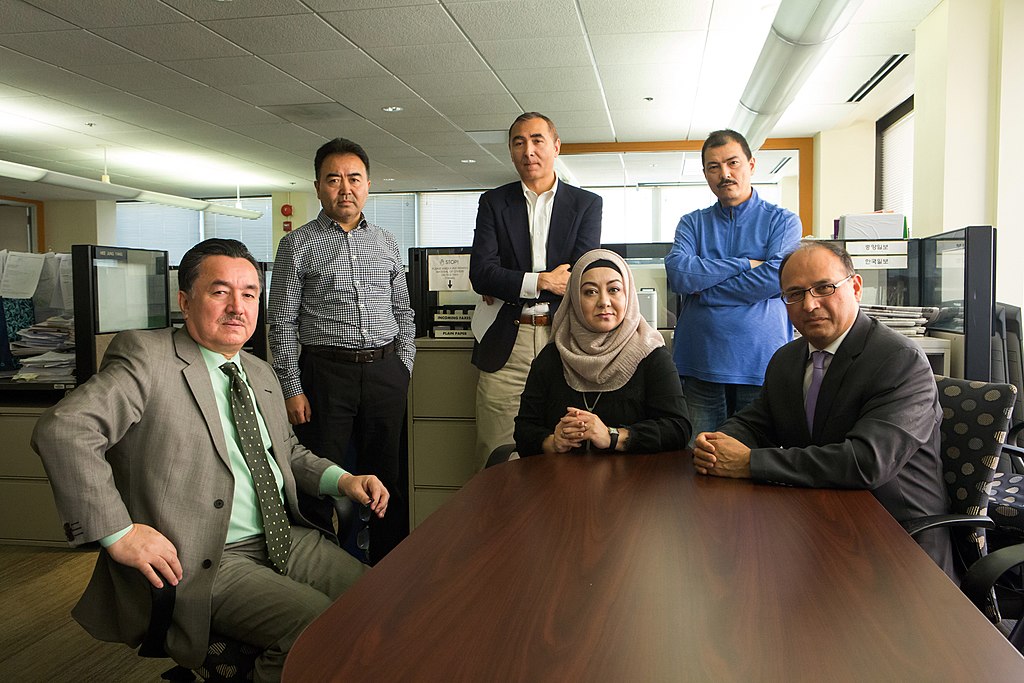Reporting from exile, an Uyghur journalist sees social media as a double-edged sword

Shohret Hoshur (on the left) along with his colleagues at Radio Free Asia. | D. A. Peterson
Shohret Hoshur, 57, is an Uyghur-American journalist. For four decades now, he has been reporting on his community. Not always from afar.
In the late 1980s, he reported for the Korgas County Radio and Television Bureau, a broadcasting platform in his county in East Turkistan, a place the Chinese refer to as the Xinjiang province. Later, he wrote articles in various newspapers and magazines.
Hoshur wanted to be a ‘free’ journalist and write about issues that affect the Uyghur community more meaningfully. Therefore, he dreamt of working with the Voice of East Turkistan, an official bi-monthly journal published from Turkey by the Uyghur Government-in-Exile.
He had no way of leaving his home in Korgas County as an arrest warrant was issued in his name and his passport application was rejected by the Chinese government. So he took someone else’s passport and slid his picture into it. Then he fled first to Pakistan, then to Turkey and eventually landed up in the United States to work for Radio Free Asia. Unfortunately, he had to leave his family behind in East Turkistan, a place the Chinese refer to as the Xinjiang province.
How Uyghurs live
Around 12 million Uyghurs live in North Western China’s Xinjiang region. Most of them are Muslim and they speak a language that is closer to Turkish than to Chinese languages. Uyghur activists fear their culture is under threat by a recent mass migration of the ethnic Han Chinese into their region. Hans are a majority ethnicity in China.
According to the BBC, human rights groups believe China has detained more than one million Uyghurs against their will over the past few years, kept them in a large network of what the state calls "re-education camps", and sentenced hundreds of thousands to prison terms.
A series of police files obtained by the BBC in 2022 revealed details of China's use of these camps and described the routine use of armed officers and the existence of a shoot-to-kill policy for those trying to escape.
In May, Michelle Bachelet, the UN High Commissioner for Human Rights, became the first UN official to visit the region in 17 years. “I have raised questions and concerns about the application of counter-terrorism and de-radicalisation measures – particularly their impact on the rights of Uyghurs and other predominantly Muslim minorities,” Bachelet said. “During my visit, the Government assured me that the VETC system has been dismantled,” she added.
The VETC is a system of vocational education and training centres which the Chinese government presents as a programme to increase job opportunities for people who live in poverty stricken areas. The United States says these are actually detention camps used to “re-educate” Uyghurs and integrate them into mainland China.
Fearing for his family
Hoshur was not convinced by Bachelet’s statement. He wrote an open letter to her claiming that eleven of his family members were missing. “I firmly believe that all my missing relatives were jailed as retaliation for my journalism work with Radio Free Asia,” he wrote.
The journalist recently called some residents of his hometown to inquire about his mother’s whereabouts. “One of the residents said that the house where my mother lived had not been cleared of snow for several years, which reflects the absence of any adults in our family,” he wrote in the letter, urging the UN to get information about them. Uyghur activists and organisations have been critical of Bachelet’s work and of her statement on Xinjiang.
I recently reached out to Hoshur by email and he responded to a few questions on Uyghur journalism, the use of social media and how Russia’s and China’s propaganda compare.
Q. What was journalism like in East Turkistan (Xinjiang) back in the 1990s? When did it cease to exist?
A. Modern-day journalism began in East Turkistan in the late 19th century. However, it gained momentum in the 1930s and 1940s, under the two East Turkistan republics established successively during that period.
After the Chinese Communist Party came to power in 1949, the Uyghur media became a formality. In the 1960s and 1970s, during the Cultural Revolution, Uyghur journalism helped the authorities with their propaganda. Because all media worked for Mao’s radical ideological agenda, there was no freedom of media to speak of. In 2017, as mass detention started, the dark days of journalism restarted. I say this because, since the control of the Uyghur region by the Chinese government, the aim of the Uyghur media based in the region has been to subjugate the Uyghur people to the Chinese government.
China claims the media should speak “the language of the party and the people” and “serve the integrity of the country." Journalists in the region have to toe the Chinese government line to protect their jobs and their families.
However, some Uyghur journalists have risked everything to speak truth to power. During the early 1990s, when China's restrictions on the media were somewhat softened by the reform and opening-up policy, Uyghur journalists functioned with limited freedom. Many Uyghur journalists began writing symbolically, so as to not attract attention. Some used language that did not take on the Chinese government directly.
Q. Can you give me an example of that?
A. The collapse of the Soviet Union in 1991 was a great inspiration to the Uyghurs in the region. There were hopes that the communist regime would end, and that even China would disintegrate, resulting in the liberation of our people. These expectations became a hot topic in secret meetings of Uyghurs and in critical articles written with symbolic methods. For example, statements such as "Mao Zedong’s statement is right: 'The Soviet Union’s today is our tomorrow’.”
I also wrote an article at the time titled Long live the house. The article included phrases such as "there is an increasing number of houses in the world" and "we must have a home". These sentences mentioned the necessity and the possibility of an independent state for the Uyghur people. At this point I was summoned to the County Information Control Department and questioned about this article. I defended myself by saying that I had written this post to promote the country's housing reform policy, not for separatist purposes.
Q. In March this year, you wrote a piece titled 'Why Uyghurs are envious of Ukrainians'. Why do you think Uyghurs have it worse than the Ukrainians right now? What role has the Western media played in that?
A. People are dying in both places. One is visible and the other is invisible. In one place, there is a count of how many people die. In the other, there isn’t. The tragedy in Ukraine continues to be an international issue, one that has some degree of support. But the ongoing tragedy in the Uyghur region is being neglected as an internal issue in China.
More than five million Ukrainians are currently in exile. By some estimates, more than three million are in Uyghur camps and prisons. This accounts for 25% of the total population.
This means that the most productive youth is incarcerated. Around 90% of families are broken up. Pictures of the victims of torture and ill-treatment in the camps have been circulating on social media despite strict news control in the region, which indicates the scale and severity of the situation.
Ukrainians are dying on the battlefield. However, Uyghurs are dying in camps, prisons and forced labour camps with endless suffering during an indefinite time period.
Just as Putin has said that Ukrainians are brothers of Russia and they do not need to be a separate nation, China too claims the Uyghurs are happy members of the country. While Russia views Ukraine joining hands with NATO as a threat to Russia's security, China claims that Islam practised in Uyghur-denominated areas threatens the country’s national security. When talking about genocide, the world just recalls bloody scenes of genocide in Bosnia, Rwanda and Myanmar. But China has created a different, invisible form of genocide.
Q. If social media had been around in the mid-1990s, would the Uyghurs face the same fate as they do now?
A. Of all the conflict and violence in the Uyghur region, the so-called Ghulja Incident [in which Chinese security forces fired on protesting Uyghurs and dozens were killed in 1997] is widely known. And yet, the uprisings that preceded it were originally larger, more violent events, but failed to make an international impact due to the lack of the Internet.
So I would say social media has made the Uyghur cause stronger and the world is more aware of it today. However, since 2010, as social media became more and more popular in China, it seems to have benefitted the Chinese government more than the interests of the Uyghurs.
The mass detention occurred in the early years of the social media boom and this didn’t stop China. Facial and voice recognition technologies have also helped China gather so-called “criminals” in the region and monitor the cells closely for 24 hours a day. No matter how developed modern technology is, if it's not in the hands of the right powers, it will become a catastrophe and will not benefit humanity. The same is true for social media.
Q. Is Russian media sugarcoating the Ukraine issue to its own population in a similar way the Chinese media is doing on Uyghurs?
A. I think China’s sugarcoating is different.
Russia, geographically and culturally, is closer to the West. So there is a certain limitation to fake news in Russia. For example, a news bulletin was disrupted by a journalist holding up a signboard pointing out Russian lies in Ukraine.
China can call Uyghurs "the happiest Muslims in the world”. China can also claim that students came to the “vocational training centres on their own free will.” But there can be no fact-checks. Although 380 detention camps are visible from satellites, China can say, "We have no camps, training centres are closed, students have graduated." There will be very few counter-questions.
On the other hand, China has become the second largest economy in the world. So most countries, organisations and companies in the world do not dare to question China. Western companies such as Tesla do not hesitate to open offices in the city of Urumqi, even though its own country has called Chinese actions in Uyghur areas a “genocide”.
The most dangerous thing is that the Chinese people have never tasted freedom in their history. So there is no tradition of protesting against fake news, no matter how illogical.
Raksha Kumar is a freelance journalist, with a specific focus on human rights. Since 2011, she has reported from 12 countries across the world for outlets such as 'The New York Times', BBC, the 'Guardian', 'TIME', 'South China Morning Post' and 'The Hindu'. Samples of her work can be found here.
In every email we send you'll find original reporting, evidence-based insights, online seminars and readings curated from 100s of sources - all in 5 minutes.
- Twice a week
- More than 20,000 people receive it
- Unsubscribe any time







